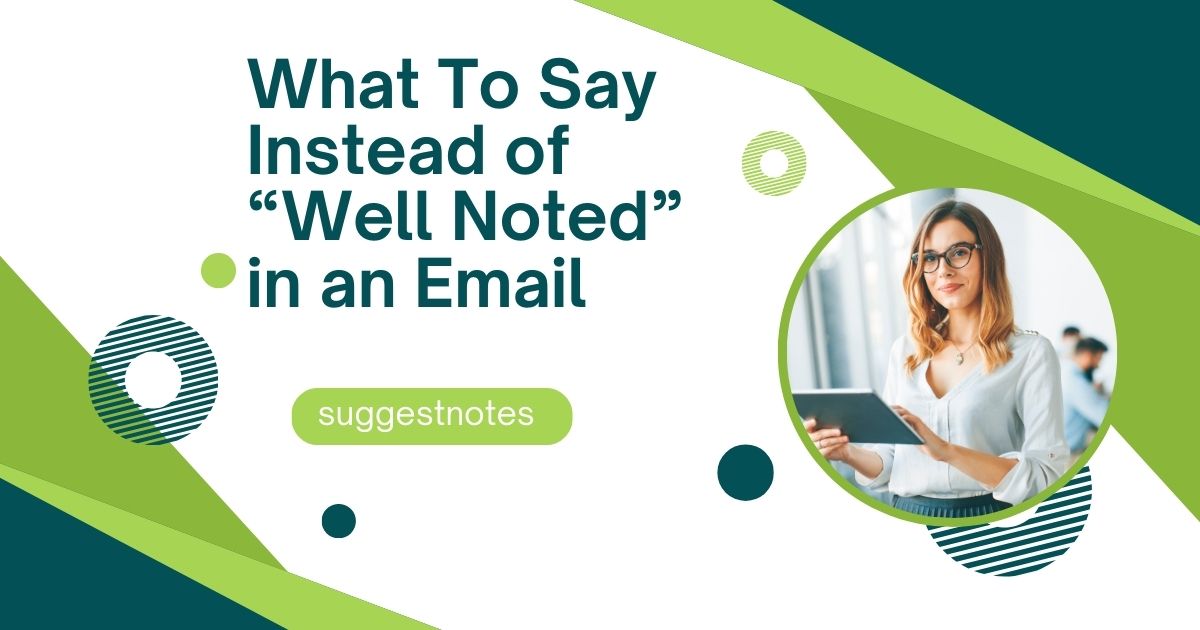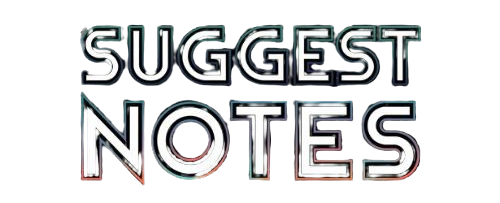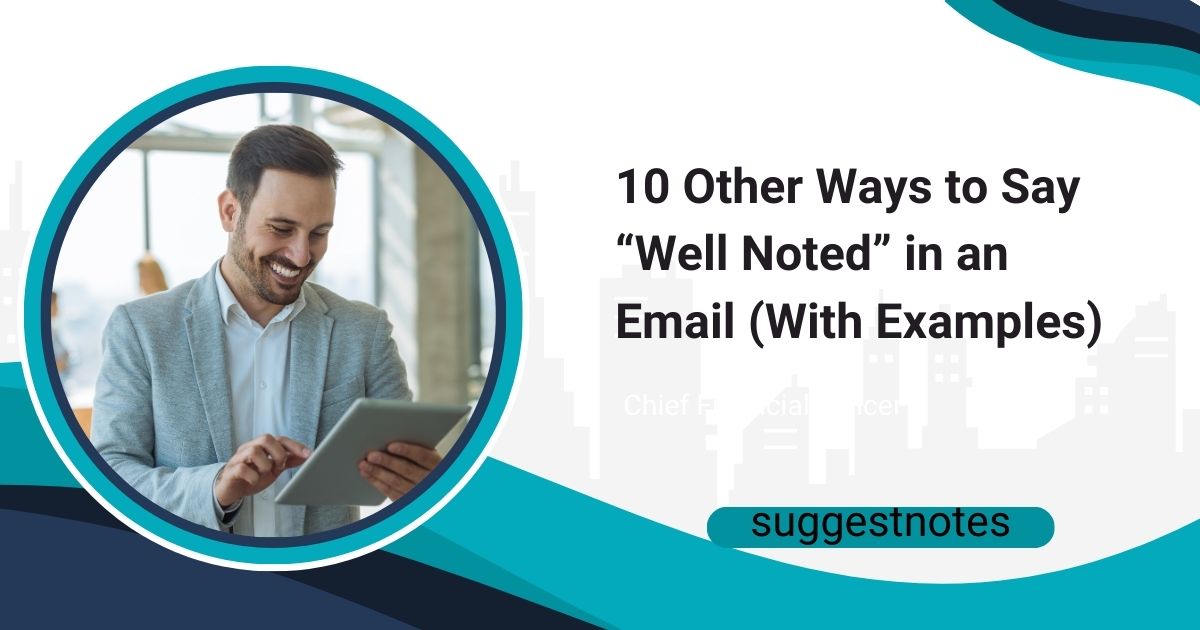It’s a useful phrase ”Well Noted”, but it can feel repetitive when used too frequently. In today’s fast-paced world of email communication, it’s easy to fall back on familiar expressions.
Along the way, you’ll find practical examples to show how you can incorporate these alternatives into everyday email scenarios.
In this blog post, we’ll look at 10 alternatives to “Well noted” that can help you communicate more effectively while maintaining professionalism. Whether you’re acknowledging receipt, confirming understanding
What To Say Instead of “Well Noted” in an Email

Here are 10 phrases you can use instead of “Well noted,” making your communication sound more engaging and thoughtful.
1. Acknowledged
“Acknowledged” is a simple and direct way to confirm receipt and understanding. This is perfect for formal or professional settings where you need to be concise without sacrificing clarity.
Example:
Subject: Monthly Sales Figures
Dear Jenna,
Acknowledged. Great job exceeding this month’s targets. Your hard work is truly making a difference.
Best, Mark
2. I’ve taken note of this
This phrase conveys that you have not only received the information but have given it some thought. It shows recognition of the other person’s contribution while keeping a professional tone.
Example:
Subject: Proposal Submission
Hi Liam,
I’ve taken note of this innovative approach you’ve suggested. I appreciate your creativity and initiative.
Best regards, Dr. Reynolds
3. Thank you for the update
If someone has taken the time to keep you informed, responding with “Thank you for the update” is both polite and professional. It shows that you appreciate the effort they’ve made.
Example:
Subject: Event Planning Progress
Dear Team,
Thank you for the update on the event preparations. It’s great to see everything coming together so well. Keep up the excellent work.
Best, Andrea
4. Got it, thanks!
For a more casual, friendly tone, “Got it, thanks” works well in informal settings. It acknowledges receipt of the information while maintaining a relaxed feel.
Example:
Subject: Quick Reminder
Hey Zoe,
Got it, thanks! The revisions you made look great, and I really appreciate your attention to detail.
–Sam
5. I will ensure this is addressed
This phrase signals that you not only acknowledge the information but also plan to take action. It’s ideal for situations where you want to reassure someone that their input won’t be ignored.
Example:
Subject: Feedback on Process Improvements
Dear Carlos,
I will ensure this is addressed. Your feedback is incredibly valuable, and I appreciate your proactive approach.
Sincerely, Ellen
6. Thank you for bringing this to my attention

Showing gratitude is always a good way to foster positive communication. “Thank you for bringing this to my attention” is a thoughtful and professional response when someone highlights an important issue.
Example:
Subject: Issue Report
Dear Grace,
Thank you for bringing this to my attention. I’m impressed that you caught this before it became a bigger problem.
Best regards, Mr. Thompson
7. I’ve recorded your details
This phrase is particularly useful when you need to acknowledge the receipt of factual information, such as contact details or updates, and shows that the details have been noted for future reference.
Example:
Subject: Update Your Contact Information
Hi Dan,
I’ve recorded your details. Thank you for keeping everything up to date; it’s essential for smooth communication.
Best, Natalie
8. I appreciate the heads-up
If someone is keeping you informed about a potential issue or update, responding with “I appreciate the heads-up” is a casual yet appreciative way to acknowledge their effort.
Example:
Subject: Potential Delivery Delay
Hi Marie,
I appreciate the heads-up regarding the possible delay. It helps us manage expectations better.
Thanks, George
Related Guide:
10 Other Ways to Say “Have a Good Day” (With Examples)
9. Understood, I’ll act accordingly
“Understood, I’ll act accordingly” is a clear and direct phrase that shows you comprehend the information and are prepared to take the necessary steps.
Example:
Subject: Suggested Changes to the Protocol
Dear Team,
Understood, I’ll act accordingly. Your suggestions for improving our protocol are excellent, and I’m excited to implement them.
Best, Dr. Hart
10. Received and will proceed as necessary
This phrase confirms that you’ve received the information and are ready to take action if needed. It’s a confident and professional way to close an email.
Example:
Subject: Client Feedback
Dear Sarah,
Received and will proceed as necessary. Your handling of the client feedback has been fantastic, and I’m grateful for your professionalism.
Best, Mr. Jenkins
FAQs
Why is it important to avoid overusing “Well noted” in emails?
Overusing “Well noted” can make your communication feel repetitive and less engaging. By diversifying your responses, you can keep your emails fresh and show more thoughtfulness in your acknowledgment.
Can I use informal phrases like “Got it, thanks!” in professional emails?
you can, but it depends on your relationship with the recipient and the formality of the situation. In more relaxed environments or with colleagues you’re familiar with, informal phrases can work well.
Can I use these alternatives to “Well noted” in formal emails?
“Acknowledged” or “Thank you for the update,” are perfectly suitable for formal emails. They maintain professionalism while offering more variation in language, which can enhance the tone of your communication.
How do I decide which phrase to use in an email?
It depends on the context and tone of the email. For formal or professional situations, phrases like “Acknowledged” or “I will ensure this is addressed” work well. In more casual or informal communication, you might prefer “Got it, thanks” or “I appreciate the heads-up.”
Should I always include an acknowledgment when replying to emails?
Acknowledging receipt of important information is a good practice, especially in professional settings. It reassures the sender that their message has been received and understood, helping maintain clear and effective communication.
Conclusion
In the world of professional communication, how you respond to emails says a lot about your attention to detail and engagement. By using these 10 alternatives to “Well noted,” you can maintain professionalism while adding variety to your responses.
Whether you’re acknowledging receipt, confirming understanding, or showing gratitude, these phrases will help keep your communication dynamic, clear, and thoughtful.

As a content writer with five years of experience, I focus on creating insightful and impactful website content that drives engagement and boosts search visibility. With a strong foundation in SEO and digital marketing, I excel at crafting compelling narratives that resonate with audiences and enhance brand storytelling. My passion for data-driven content creation allows me to deliver pieces that not only inform but also inspire action. Whether through blog posts, web copy, or informative articles, I strive to empower businesses to connect authentically with their customers.







